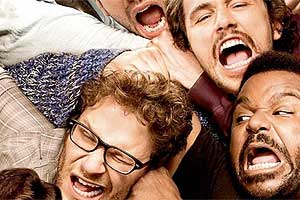
The Earth has been coming to an end with comic frequency. We’ve seen tsunamis sweep the oceans (2012), the world freeze over (The Day After Tomorrow) and a rogue planet bear down (Melancholia). So many have been patrolling a desolate Earth – Will Smith (After Earth), Tom Cruise (Oblivion), a cute cleanup robot (WALL-E) – that even the post-apocalyptic world is getting crowded.
But now, months after the Mayans predicted the end of the world, comedians are having the last laugh – or at least, a Last Days laugh. Opening next Thursday is Seth Rogen and Evan Goldberg’s This Is the End, in which the rapture arrives in the midst of a Hollywood party at James Franco’s house.
The World’s End is opening in New Zealand in July and earlier this year, there was It’s a Disaster, where nuclear calamity interrupts a New Orleans couples’ brunch. Also just out is the farcical Rapture-Palooza, in which Craig Robinson (a star of This Is the End) plays the devil incarnate. Last year, Seeking a Friend for the End of the World, with Steve Carell and Keira Knightley, put a romantic comedy twist on the world’s end.
The movies are particularly fitting if you consider that, ultimately, all comedy is laughing in the face of death. If tragedy plus time equals comedy, the End of Days (a fiery demise followed by eternity) supplies plenty for both parts of the equation.
“We always say the worse off the characters are, the funnier it generally is,” says Rogen. “And there’s no situation much worse than this.”
In This Is the End, easily the funniest and highest profile release of the bunch, the cast (including Jonah Hill, Danny McBride and Michael Cera) play warped and exaggerated versions of themselves. When Los Angeles goes up in flames, they bicker selfishly among themselves over dwindling supplies, cattily referring to each other’s movies. Cabin fever leads to betrayal.
“We wanted to take the people who were the least prepared to deal with something like this and put them in this situation,” says Goldberg, the co-writer with Rogen of Superbad and Pineapple Express.”
And the least skilled humans on Earth, arguably, are actors. Seth and I always talk about how he learned how to cook chicken for the movie Take This Waltz. I’d rather be with an electrician or a carpenter or a hunter.”
Ironically, comedies like This Is the End actually feel more personal than the majority of actual disaster films, where spectacle often dwarfs humans. Todd Berger, writer and director of It’s a Disaster, was inspired to make his film – a social satire of self-obsessed 30-somethings – after talking to his sister, a nurse, about her experience in New Orleans during Hurricane Katrina.
“I asked her: ‘So was it like a disaster movie”‘ says Berger. “She was like, ‘No. Some people were freaking out, but you can only freak out for so long. Some people eventually started reading magazines.”‘
Says Berger: “Not everyone is going to respond to a disaster like Sylvester Stallone in Daylight”‘
Ad Feedback
There are, of course, other movies to satirize the end of the world, most notably Stanley Kubrick’s 1964 classic black comedy about Cold War nuclear fallout, “Dr. Strangelove or: How I Learned to Stop Worrying and Love the Bomb.”
For many, zombie movies are their own genre separate of apocalyptic films, but Edgar Wright’s 2004 comedy Shaun of the Dead remains a central touchstone for doomsday laughs. In the film, one revered by Rogen and Goldberg, Simon Pegg stars as a protagonist reacting with British understatement to marauding zombies.
“We definitely don’t see ourselves as parodists at all because we genuinely love these movies,” says Wright. “If anything, it’s exactly the opposite: that we’re almost like frustrated serious genre filmmakers who can’t do it any other way.”
Wright and Pegg’s next film, The World’s End, has been lumped into the trend of comedic apocalypses. In it, middle-aged friends reunite for a pub crawl in their home town, a journey to conclude at a pub called The World’s End. Along the way, the townspeople are revealed to be robots that take after ’50s and ’60s science fiction like Village of the Damned or Body Snatchers.
“It’s this thing of laughing in the face of death,” says Wright, explaining that the refusal of Pegg’s character to grow up plays a significant role in their predicament. “He’s a character who’s trouble for his friends on a social level and also, eventually, on a galactic level.”
A similar spirit of both celebrating and contorting genre motivates Goldberg and Rogen. Goldberg recalls an inspirational meeting with screenwriter and eventual Iron Man 3 director Shane Black to discuss their script for The Green Hornet, which aimed to be a funnier superhero film.
“He told us: ‘You guys take things and you flip it on its head.’ We hadn’t done it enough with the Green Hornet yet. And he told us we needed to do it more. Shane Black’s one of our idols, so we really took it to heart. We realized: This is what we do and do well. We’re just attracted to big, crazy things. We love aliens and the end of the world and things exploding. We just like it big.”
“We’re just generally reactionary filmmakers, in a way,” says Rogen. “We do try to do our version of what people are doing. The more of them there is, the more we want to try to do what we consider to be a good version of it.”
The pair acknowledge they’ve long considered doing their take on a space adventure. Next, though, they’ll turn to another genre: the political thriller. Rogen says the film, currently titled “The Interview,” is their version of Ben Affleck’s Argo – “a political thriller with idiots.”
“That’s pretty much our whole deal,” says Goldberg. “Add idiots to an existing genre.”
– AP